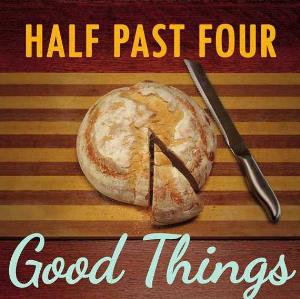Artist: Half Past Four
Album: Good Things
The logic of belatedly reviving my best-of-2013 countdown on Thanksgiving weekend — after having left it too often neglected in a 2014 that’s been dominated for me by my mother’s fatal cancer, which has left me busier, less-helped, and sadder  than usual — is that I personally tend to write music reviews in the spirit of giving thanks, a spirit I’d like to get back into.
than usual — is that I personally tend to write music reviews in the spirit of giving thanks, a spirit I’d like to get back into.
As an extra incentive, given which album I had waiting at #18, Thanksgiving is also a holiday about immigration. Or at least, some of my Facebook friends treat it that way, passing on cartoons and sly jokes about the original Thanksgiving fest being one where white Europeans were the undocumented aliens who didn’t speak the language. I find the politics of this dubious. Thanksgiving is if anything the worst case scenario, where you reach out to the undocumented and they kill most of you with plague, shoot enough of the survivors to quell further resistance, and steal your land and herd you into grim “reservations”. I prefer to focus on basically every subsequent example of American immigration instead. Like the welcome provided to my mom’s ancestors, supporters of Bonnie Prince Charlie’s failed Scottish revolution against the English crown, who were allowed to emigrate to the colonies instead of being executed. Or to the more fortunate of my dad’s Jewish ancestors, who decided to put as much space as possible between themselves and the pogroms, instead of waiting around to die, however bravely, in the Warsaw Resistance against Hitler’s death camps.
Welcoming my family didn’t lead to anything extraordinary for the United States, but it led to a lot of positive ordinariness: a large, productive scattering of city planners, teachers, librarians, nurses, classical musicians, cryptographers, and other people notable for not burning the country down and destroying civilization forever. Multiply them out and you get enough immigrants to supply one of the richest, most diverse, most creative societies the world has ever known. Whereas a lot of the financial sector we can still blame on descendants of the Mayflower crew.
Starting in the 1980s, the United States has undergone one of its periodic eras of treating immigrants with deeper suspicion and fewer social services, so perhaps for that reason, or perhaps by coincidence, the core members of Half Past Four — bassist Dmitry Lesov, keyboardist Iggy Kurtzman, and guitarist Constantin Necrasov — found themselves leaving the former USSR, as boys or college students in the mid-to-late 1990s, and moving to Toronto, Canada instead. I won’t imply the U.S. made a tragic error in not recruiting them first; you can buy their two albums, including 2013’s Good Things, quite easily here, and nowhere near enough people have done so yet to much impact the trade deficit.
In doing so, you’ll get what sounds like a glossy ‘80s hard rock band, with a smooth, soulful, supple-voiced female (Canadian) singer who calls herself Kyree Vibrant. Except I don’t know of any actual ‘80s hard rock albums as musically interesting as Good Things, because Half Past Four keep crossing you up. There’s all the jazz chordings, some as pretty as a Stevie Wonder or Steely Dan record and others more unnerving like King Crimson. There’s riffs that, however glossy, are too heavy to have made the radio before Metallica became superstars in 1991. There’s the casual use of piano and 7/8 time on the title track. Rise breaks into surf-rock midway through the song. Spin the Girl is joyously cuckoo, a heavy-metal Broadway folk dance at a crazed waltz-of-death pace. Fate’s verses are piano-centered and in 9/4 time, but Necrasov’s guitar work still makes them sound like Pink Floyd somehow. The Earth ends the album centered around a 5/8-time sprint — and later a 7/4 stomp — that’s heavier than even the 1980s version of Metallica, as well as (this part is easier to achieve) more operatic.
I still think it will aid Half Past Four appreciation if you enjoy the commercial primes of Van Halen and Guns’n’Roses and Bon Jovi, at least their singles. But hey, time was when that music was illegal, back in the USSR. One assumes it was sought out, on average, by the especially curious. And it’s the nature of the especially curious, and their offspring, to tamper heavily with the things they love.
– Brian Block
To see the rest of our favorites, visit our Favorite Albums of 2013 page!
